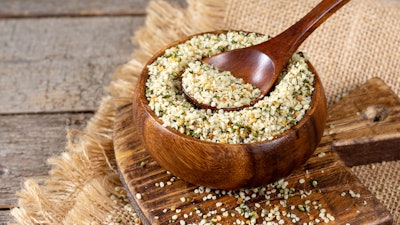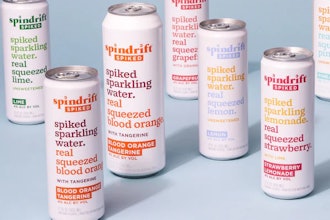
The Hemp Food Association has announced its reboot.
Started in 1998 by hemp food pioneer Richard Rose, it is the only association dedicated to only foods made from the hempseed, and is the second-oldest hemp trade association in the world. The HFA website is a huge resource for those in the industry, breaking news with emerging studies and patents, over 80 original articles, a directory of hemp food companies, and 16 free downloads of valuable tools for hemp food makers or other entrepreneurs.
Twenty-four years ago, it boasted a stellar board of advisors composed of the leading hemp scientists of the day: Robert Connell Clarke of the International Hemp Association and author of many books, Dr. Jace Callaway of the University of Finland, Dr. Dave Pate of the International Hemp Association, Dr. Dave West of Gametec, and Dr. John McPartland. Global membership totaled 46 in 1998.
Then, in 2001, when the hemp food market died for 2.5 years, almost taking Canadian hemp down with it by suing DEA to stop legalization outright of 98% of the industry with no maximum THC, the HFA temporarily lost its mission and went dormant, waiting for the day society caught up.
That day is today.
Why reboot the Hemp Food Association now?
“I've been advocating and educating on hemp foods all these years. It's a woefully under-appreciated segment, despite having been the only hemp product sold in tens of thousands of stores around the world for years, and with tens of millions of frequent customers as well as the most potential future retailers, customers and products," Rose said.
Although shelled hempseed was only invented in 1996, today hemp foods are 100% legal to FDA and not needing any more certifications or approvals from any agency in the U.S., Canada, or the E.U. Hemp foods are literally hemp's first billion-dollar segment, 90% of Canadian hemp, and one which doesn't even necessarily require land, equipment, or a factory with which to get started. It's such an important and high-volume product that USDA tracks the retail prices of it.
Food from hempseed has long been hemp’s value driver. Unapproved and expensive Hempcrete struggles to find a place in the mainstream building trades, CBD is illegal to FDA and the market crashing, fuel puts expensive hempseed oil into cars instead of stomachs, there is almost no processing in the country for hemp textiles and hempseed for animal feed just continues the failed CAFO system turning abundance into scarcity.
But hempseed for food is not only a commodity proven in the global marketplace for over 25 years, it is also the best hemp product to fight climate change. Since everyone eats, it has a potential market of 100% of consumers and is the easiest for new or existing companies to add to their offerings. The total wholesale market is potentially tens of thousands of businesses, and it has the potential to diversify and democratize the hemp industry for motivated entrepreneurs. Especially in this age of food insecurity, feeding hungry mouths a complete protein high in omega-3 is a noble and high calling.
Not a medicine yet it is medicinal; it’s been found to be anti-inflammatory, anti-oxidant, kills cancer cells and glioblastoma cells, helps with ACE inhibition (reduces blood pressure), and reduces cardiovascular disease. Bioactive peptides have been found in the seed, which are neuroprotective. Cannflavins in hemp sprouts are anti-inflammatory and more. Cannabisin in the shells is also neuroprotective. Hemp protein powder can even remediate toxic “forever chemicals.”
Ten times more fiber (hurd and bast) is produced on the farm than shelled hempseed, adding another income stream for the farmer. Hemp foods can be 3 times better at reducing greenhouse gasses than Hempcrete, and 11 times better than Electric Vehicles.
It also helps another pressing global problem, that of food security and sovereignty. Hemp production has the potential of complementing and improving production of other domestic grains, such as soya, corn, sunflower, and wheat.
Over 100 companies currently make hemp foods in the U.S. alone, a few are even publicly-traded. And there are several dozen more abroad, from China and Japan to Europe. Over 20 years ago hemp foods were on national TV dozens of times, magazine, local TV and radio hundreds, and in thousands of newspapers across the country, over 100 million impressions.
Done right, the hemp food segment conforms to Sustainable Development Goals 1 (ending poverty), 2 (end hunger, achieve food security and improved nutrition and promote sustainable agriculture), 3 (ensure healthy lives and promote well-being), 5 (achieve gender equality), 7 (ensure access to affordable energy), 8 (decent work), 9 (build sustainable infrastructure, industry and innovation), 10 (reduce inequality among countries), 12 (responsible consumption and production), 13 (combat climate change), 15 (ecosystems), 16 (human rights), and 17 (partnerships to achieve the goals).
Hempseed, hempseed oil, and hemp protein powder are Generally Recognized As Safe (GRAS) to the U.S. FDA, exempt from Novel Food registration in the European Union, and hemp products in general are exempt from the U.N. Single Convention Treaty on Drugs. They need no further approvals or certifications from any government in the U.S., Canada, or E.U. In other words... legal!
Today, the academic research and technical industrial advances are frequent and impressive, new discoveries and products monthly. Hemp is one of mankind's oldest cultivated crops, therefore hempseed is as well. Its use as food is millennia older than either soya or rice as food.
Yet, despite the importance of the segment few government grants have been given for research into seed as food, instead concentrating them on fiber products still looking for a market, and variety suitability mostly for fiber.
Membership in the HFA is free to consumers (fans of hemp food), and hemp food marketers and manufacturers. See more at https://the-hfa.org.






















